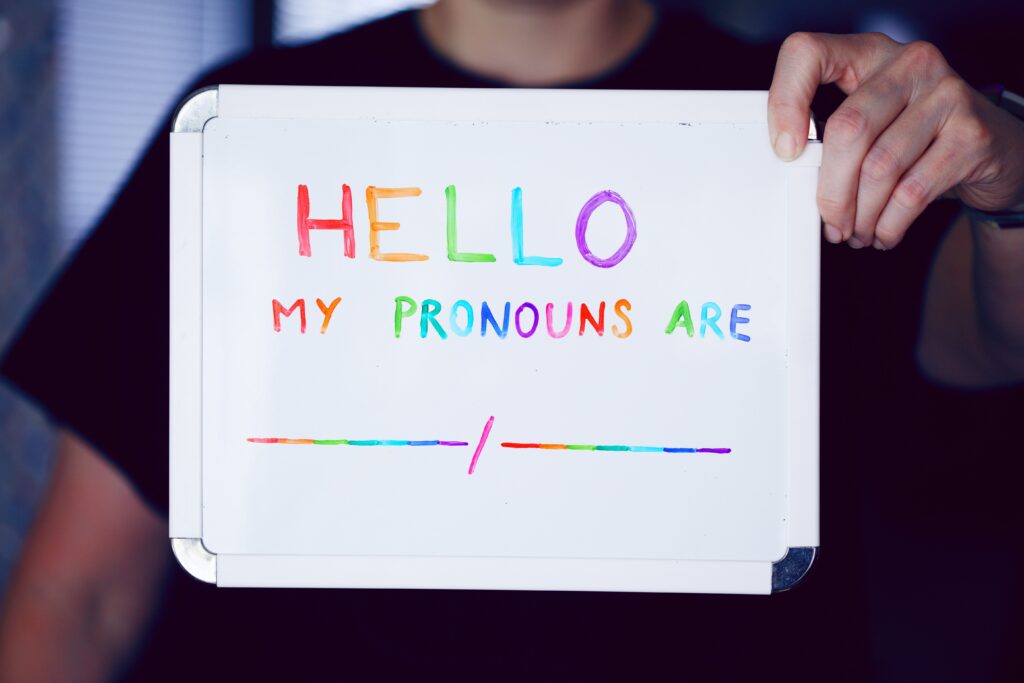
Some time ago, a friend of mine posted something about our scars are not something to be ashamed of. Instead, they are something to be thankful for, because they show us how God has led us. I commented that this reminded me of a song called “Scars” by the group I AM THEY.
So far, so good. Until one of my good friends commented that he was triggered by the use of a plural pronoun with a singular one, because of how people were changing their pronouns. I explained that it was a group, not a solo person. It had nothing to do with a person’s pronouns, providing a link to a site that had proof.
Preferred Pronouns
This incident highlights the contrast between those who are accepting of people’s choice to use different pronouns, versus those believe that there are only two genders. They say we shouldn’t pamper people by using their preferred pronouns. It’s been a hot topic since the recent presidential executive order ruling that there are only two genders in this country.
The reality is, though, no executive order can change the fact that some people don’t feel comfortable with the binary pronouns he/him/his or she/her/hers. As a cis woman, I’m fine with the typical female pronouns. But I have been trying to understand the experience of people who choose to identify with other pronouns. Understanding is the foundation for empathy, and without empathy, there can be no influence. I want to share a few thoughts on experiences I have had with learning about pronouns. I also will share a brief history of using they/them as singular pronouns. Finally, I will provide a few insights into what we can do when we encounter someone who wants us to use different pronouns to describe them.
What is a Pronoun?
Before continuing, let’s very quickly answer the question, What is a pronoun? A pronoun is used in place of a noun, whether a name or some other identifying noun. When I talk about my daughter, I do not keep saying “my daughter” every time I referred to her. I would do what I just did in the last sentence and use the pronoun “her” to talk about her. I might say, “My daughter is a beautiful young lady. She is also a talented artist.” (Neither of those statements are an exaggeration, by the way.)
Most cisgender men and women prefer the traditional pronouns he/him/his or she/her/hers respectively. Many transgender people adopt the pronoun of the gender with which they identify. However, many non-binary and intersex and other queer individuals prefer the neutral pronouns they/them/theirs, because they just don’t identify with a specific gender.
Star Trek and Pronouns
When Covid hit, I began spending some of my spare time watching Star Trek. I quickly became a fan. Within a couple of years I had watched every episode of every series available at the time. Something quickly became apparent to me: Star Trek was quite progressive. It was “woke,” long before “woke” was a thing. They had a black female lieutenant in the original series, shortly after the Civil Rights movement.
Over time, Star Trek’s treatment of the disabled (finding ways to accommodate them instead of marginalizing them) and those who did not fit normal expectations (some alien species had only one gender and others had more than two) paved the way for many people to accept these things in real life. Some would say this is a bad thing. I believe instead that respecting the choices of others is just the flip side of the coin of wanting others to respect our choices. Anything that helps us learn to do that better is beneficial.
In one episode of the series Star Trek Discovery, a young woman who clearly does not fit gender norms asks to be called “they” instead of “she,” because they “never felt like a she.” And the guy she told was so gracious, didn’t make a big deal about it, and instantly accommodated her. Watch the clip here:
When I watched this episode for the first time, there was a lot of talk about pronouns. Many people were complaining about them. I myself was struggling to accept the idea of using someone’s preferred pronouns if they differed from gender norms. But I decided that there was no reason to fight it if I ever ran into someone who had different pronouns.
Guy at Music School
A year or two later ago I began taking voice lessons. On the walls all around the waiting room, were pictures of the various staff members with their name, position at the school, and a short bio—and their pronouns. Most had the pronouns you would expect, but one of them didn’t. It was a guy with they/them pronouns. They loved to dye their hair various colors, depending on the season. They were always very sweet, very kind, and extremely helpful. Because they were the first person I ever known personally that had the they/them pronouns, it was a struggle to use them. Sometimes it still is. But I worked at it any time I had occasion to use their pronouns (which wasn’t often), and it became easier.
Uber Passenger’s Partner

One of my many jobs is driving Uber. I meet a lot of interesting people in my car. One passenger told me that her partner was intersex. Some days they felt like a man and some days they felt like a woman. Which would be totally logical, considering that genetically they are both. So they choose to use “they/them” as their preferred pronouns, because they don’t really fit either category. This was about a year ago. I wonder how they are handling the new rules that say that they have to pick one gender. Unlike those who are transgender or Star Trek’s Adira, they actually are non-binary at a genetic level.
A Brief Lesson on Pronouns
When it comes to using “they/them” as a singular pronoun, it might feel wrong. Dt also might feel like a recent thing. Neither of those is true. As early as the 14th century, using they as a singular pronoun to refer to someone whose gender was unknown or purposely disguised has been a thing. For more information, check out this Purdue University page.
This is because languages evolve. When I was learning Spanish, I learned that there are 4 ways to say “you” in Spanish. Three are commonly used in most modern Latin American Spanish countries, but there are exceptions. There are both singular and plural forms of you, tú, usted, and ustedes. Usted is the singular formal version that is used with strangers or anyone to whom one wishes to show respect. Tú is used with family and close friends. In some countries, it is used for almost any peer; in others, children don’t use it for their parents as a sign of respect. The exact rules of when to use one or the other tend to vary from country to country. I once had a Peruvian man tell me that I should use tú when talking to people I met. He said it would make them feel more comfortable with me. By contrast, in Mexico, it could be offensive to use it with a stranger I just met unless they were decades younger than me. The plural informal vosotros (used only in Spain) is shortened to vos by Argentinians and is used as a singular you instead of tú.
Are you thoroughly confused now? I wrote all that to make a point. Each of these variations came from a language originating in Spain, and over the centuries have evolved quite a bit. This is just one simple—or not so simple—example of how language, and pronouns specifically, can evolve over time. So why would English pronouns not do the same thing?
In fact, they have. If you have ever read the King James Version of the Bible or Shakespeare, you will be familiar with the word thee as a substitute for you. However, it isn’t actually a substitute, because you appears also, along with the antiquated form ye. I used to wonder why these two forms existed, until I began to learn Spanish. I noticed that my bilingual Bible said tú whenever the KJV used thee, and vosotros (plural you) where you/ye appeared. A little research proved that thee/thou/thine were singular second person pronouns, and you/ye/your were plural second person pronouns. Over time, thee, thou, thine, and ye were dropped from modern English venacular, and they only exist in literature.
The Root of the Issue
All this to say, there is nothing wrong with using they/them to refer to a single individual. I have already done it multiple times in this article. Those who take issue with it have no grammatical basis for their opinion. So upon what is their opinion based? According to scholar Dan McClellan, it’s just a way of propping up one’s “naïve, right-wing authoritarian identity politics.” His words, not mine. I would just say it is based in prejudice.
But deeper than that, it is based on pride of opinion. That opinion goes something like this: If I’m right, then you must be wrong. And because my opinion is based on the Bible, I am right. God only made two genders. So if you claim to be nonbinary and want me to use a gender-neutral pronoun, too bad, so sad.
The reality is, this attitude does nothing at all to draw people close, to form connections and relationships. Nor does it make Jesus attractive to those who do not yet know Him. Instead, it alienates people; and if it is tied to religion, it alienates them from Jesus as well.
So I want to challenge you. If you have someone in your life that has given you pronouns that do not match what you would naturally call them, instead of judging them as wrong, love them the way they have asked you to love them and use their preferred pronouns. Even if it’s awkward, which it will be at first. And let the Holy Spirit do His work of convicting if indeed He doesn’t want them to identify the way they do. That’s not your job nor is it mine. Our job is to love our neighbor as ourself (see Matthew 22:37–40).
Or as Danny Gokey put it:
If you want to talk to someone about navigating this process of using someone’s pronouns, or if you need someone to talk to about how people aren’t using your preferred pronouns, I’m a coach and I’d love to talk to you. Schedule a free session here.
